Key takeaways
- Community life coaching enhances personal growth by fostering connections and a sense of belonging within the community.
- Library reading programs serve as a platform for diverse voices, encouraging empathy and bridging generational gaps through shared experiences.
- Active listening and patience are crucial in both community service and coaching, allowing individuals to grow at their own pace.
- Creating inclusive spaces and celebrating shared interests can lead to lasting community bonds and collective growth.

Understanding community life coaching
Community life coaching, to me, is about more than just guidance—it’s about connecting with the very fabric of the community and helping individuals find their place within it. Have you ever felt stuck, unsure how to contribute or grow? That’s where community life coaching steps in, offering support to navigate these feelings and build meaningful connections.
I find it fascinating how this coaching focuses not just on personal goals, but on strengthening community bonds. It’s a shared journey where growth happens collectively, making every small victory feel like a win for everyone involved. The emotional impact of seeing people support each other genuinely inspires me.
What if we viewed our challenges through the lens of community life coaching? It encourages reflection on how our actions ripple through the community, urging us to live not in isolation but in harmony with those around us. This perspective has personally helped me find deeper purpose in everyday interactions.
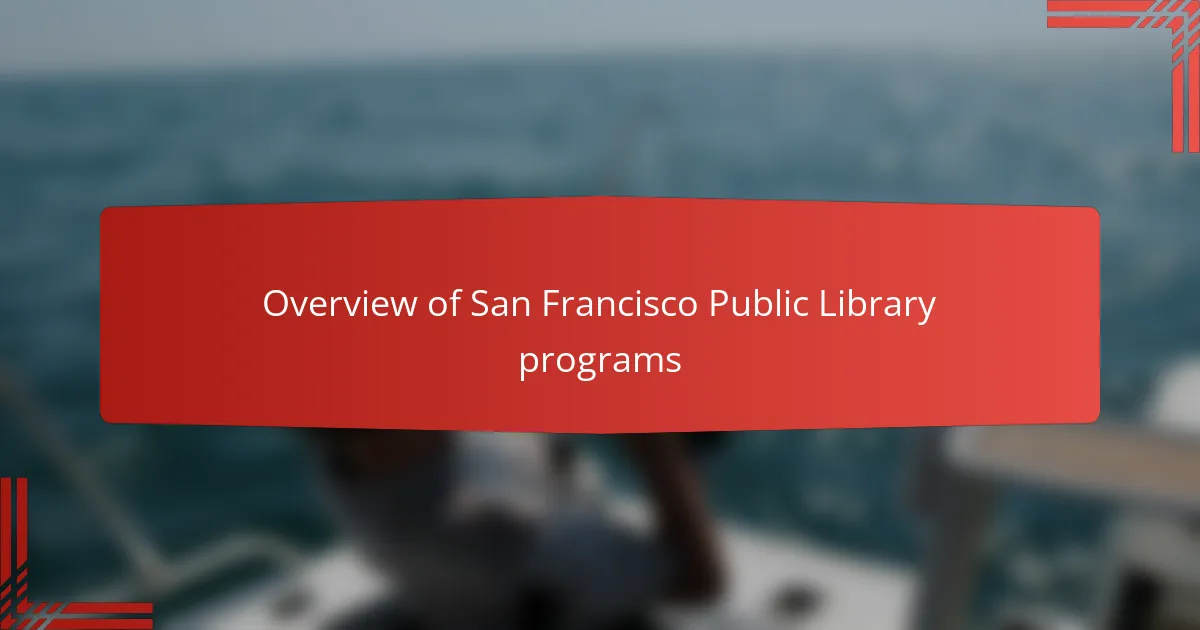
Overview of San Francisco Public Library programs
The San Francisco Public Library offers a wide range of reading programs that feel like a warm invitation to dive into new worlds and ideas. Have you ever stepped into a space where books and community come together so effortlessly? That’s exactly the vibe these programs create, blending learning with connection in ways that truly resonate with me.
What strikes me most about these programs is how thoughtfully they cater to all age groups—there’s something special for kids just starting to read, for teens exploring their interests, and even for adults looking to expand their horizons. I remember joining a book club for adults and discovering not only great reads but also wonderful conversations that left me feeling part of something bigger.
The library’s commitment goes beyond just books; it’s about fostering a sense of belonging. When I attended a storytelling event, I witnessed the powerful role these programs play in bringing diverse voices together, sparking empathy and community spirit. Doesn’t that make you wonder how something as simple as reading can unite so many different people?
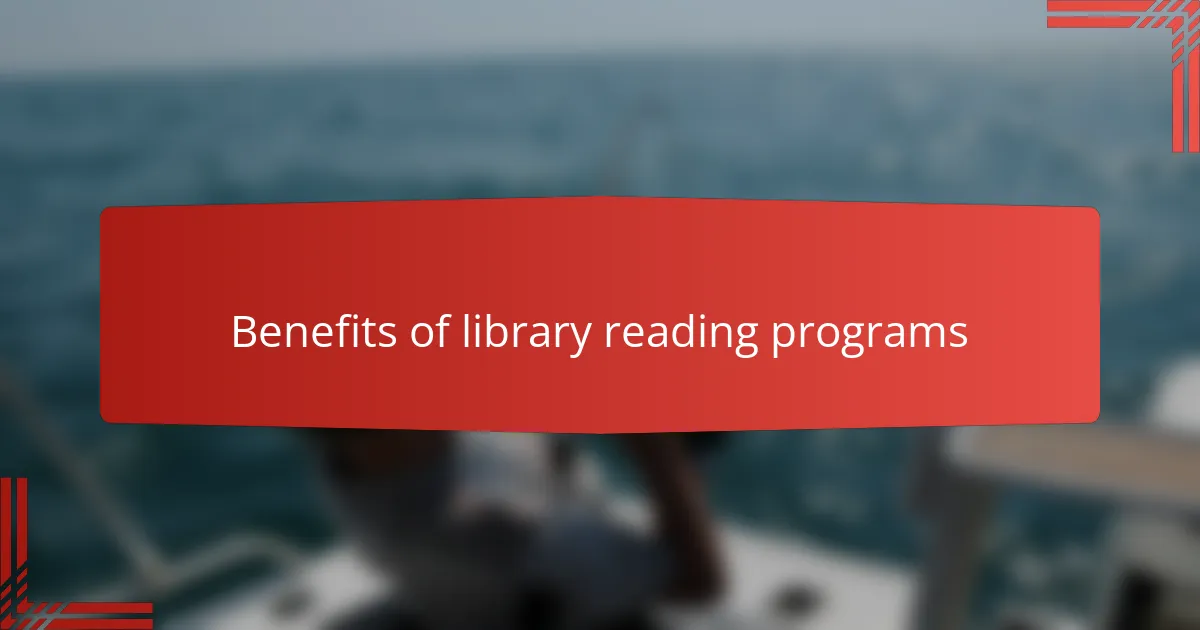
Benefits of library reading programs
One of the greatest benefits I’ve noticed in these library reading programs is how they create a genuine sense of belonging. Have you ever felt like you were just another face in a crowd? Here, every story shared feels like it bridges a gap, connecting me with others on a human level.
I also appreciate how these programs nurture curiosity and lifelong learning. It’s inspiring to see kids’ eyes light up during storytime or adults eagerly discussing ideas from a recent book. That collective excitement becomes contagious, reminding me how learning together can energize a whole community.
What surprised me most is how reading programs encourage empathy by exposing us to diverse perspectives. Listening to stories from different cultures and experiences helped me step outside my usual worldview, sparking compassion and understanding I hadn’t anticipated. Could reading really be one of the simplest yet most powerful tools for building stronger communities? I believe it is.
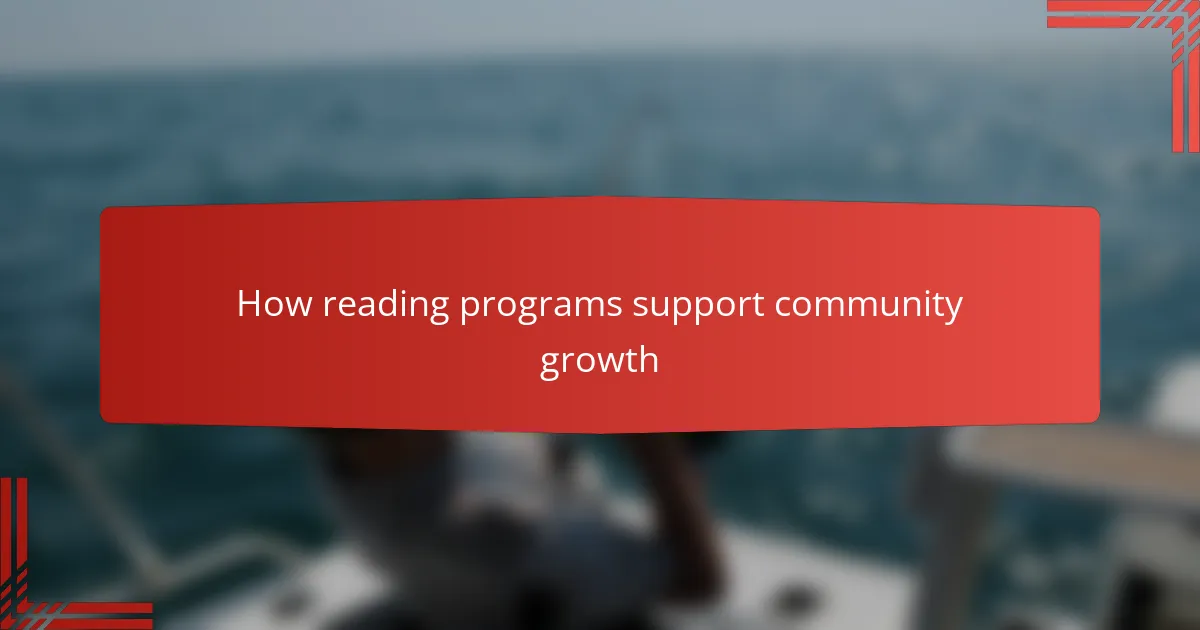
How reading programs support community growth
Reading programs do more than just improve literacy—they spark conversations that weave community members closer together. I’ve seen neighbors who barely nodded to each other before share laughs and stories after a simple group reading session. Isn’t that the kind of connection we all crave?
What’s powerful about these programs is how they create safe spaces for sharing experiences and ideas. When I participated in a multi-generational book discussion, the generation gap felt bridged by the stories we exchanged. It made me realize how much growth can happen when we listen, really listen, to each other.
On a larger scale, reading programs empower individuals to contribute to their community’s cultural richness. Watching new voices emerge from these gatherings reminded me that growing a community isn’t just about numbers—it’s about nurturing the unique stories everyone brings to the table. Have you ever felt inspired to share your own story? That’s the magic happening here.
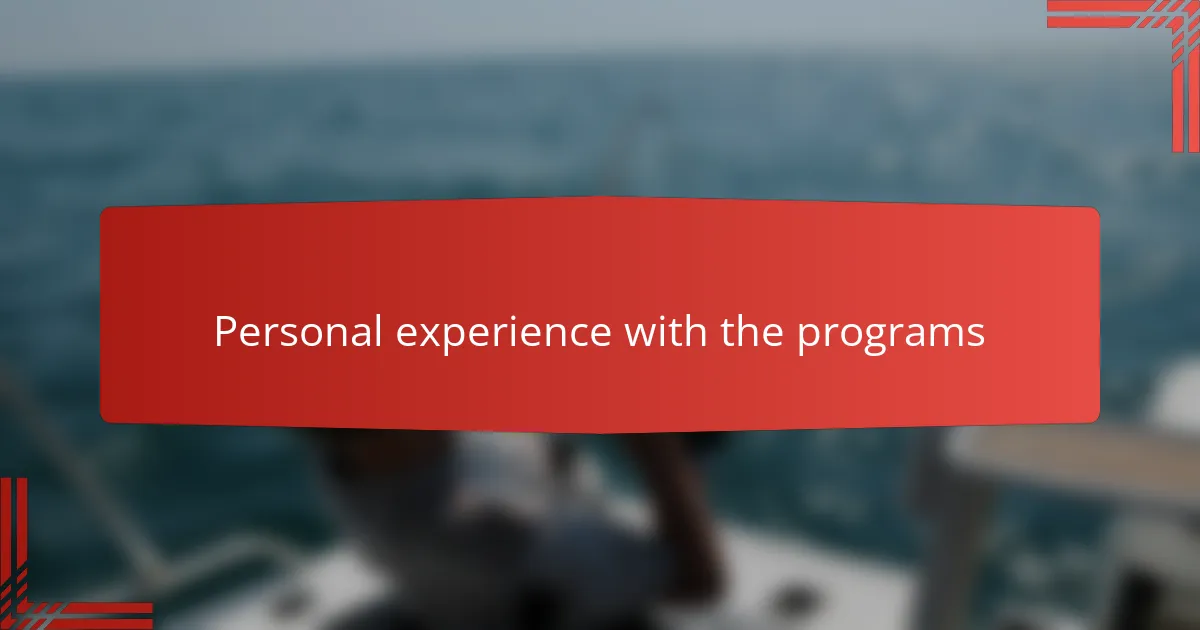
Personal experience with the programs
I remember attending my first session of the San Francisco Public Library’s reading program feeling a bit hesitant, but that quickly changed as I was welcomed into a circle of diverse voices sharing their stories. It struck me how easily the pages of a book became a bridge to genuine human connection. Have you ever felt that unexpected warmth from a group of strangers brought together by a simple love of reading?
What resonated most with me was the feeling of growth—not just intellectually but emotionally. During one particular book discussion, I found myself reflecting deeply on experiences I hadn’t considered before, which challenged my perspectives in the best way. It’s incredible how the library’s programs create these moments where personal insight feels intertwined with community learning.
Sometimes, I caught myself looking forward to these gatherings not just for the books but for the laughter and thoughtful conversations that followed. The joy of sharing ideas and hearing different viewpoints made me realize the library’s reading programs are more than educational—they’re a space for heartfelt connection. Don’t you think that’s what true community is all about?
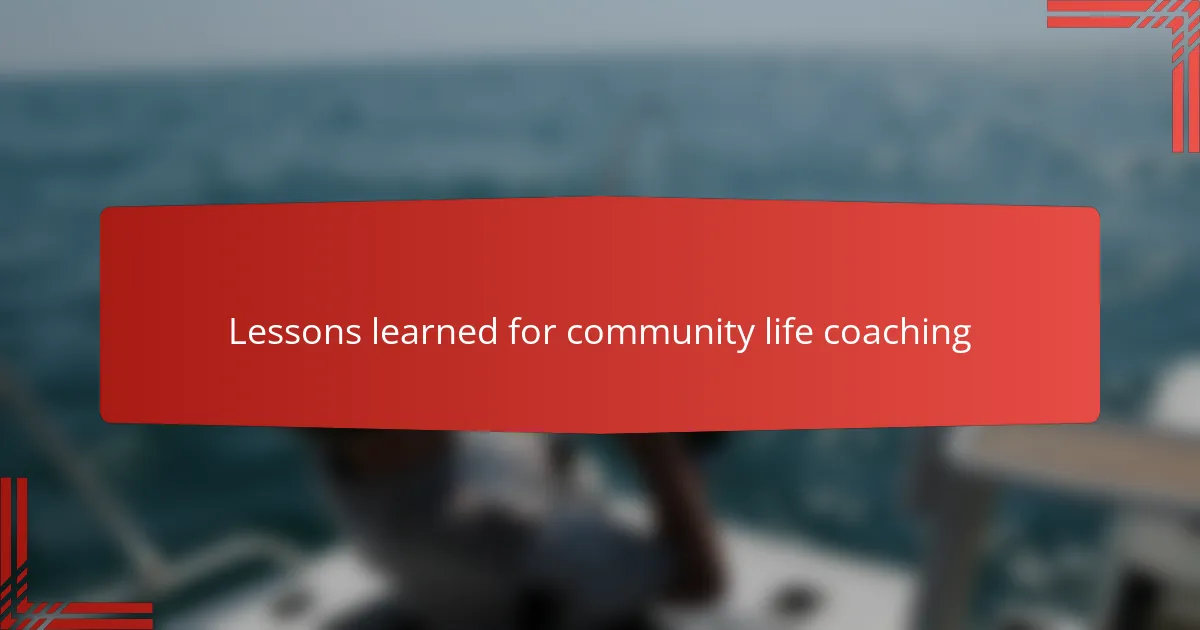
Lessons learned for community life coaching
Reflecting on my time with the San Francisco Public Library’s reading programs, I’ve realized that community life coaching thrives on creating inclusive spaces where every voice matters. Have you noticed how sharing stories can break down barriers and spark genuine dialogue? That simple act of listening becomes a powerful tool for fostering trust and empathy within a community.
I’ve also learned that patience and openness are essential. Sometimes growth feels slow or uneven, but observing how participants gradually open up during these programs reminded me that coaching is often about holding space for transformation, rather than forcing it. Doesn’t that shift in mindset make us more effective mentors and connectors in our communities?
Finally, these experiences taught me the value of nurturing shared experiences to strengthen bonds. When people come together around a common interest—like a book—they build bridges that extend far beyond the initial encounter. How often do we, as community life coaches, create opportunities for meaningful collaboration that resonate long after the session ends? For me, this is where real community flourishes.
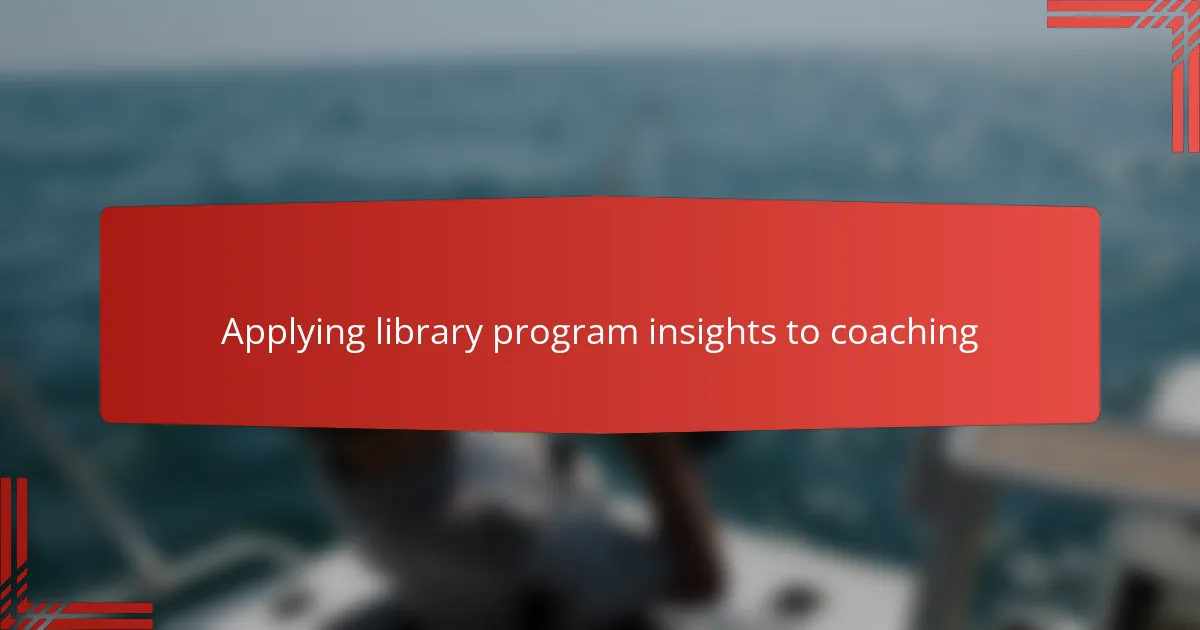
Applying library program insights to coaching
One thing I’ve taken from the library’s reading programs into my coaching practice is the power of shared stories. When people open up about their experiences, it creates a space where empathy and understanding grow naturally. Have you ever noticed how simply listening to someone’s story can shift the whole dynamic of a group?
I also find that the gradual unfolding of trust in these programs mirrors what happens in coaching. Patience becomes key — pushing too hard can close doors, but allowing conversations to flow at their own pace invites deeper connections. This approach has helped me guide clients more gently, honoring their unique journeys.
Lastly, the library taught me that creating inclusive, interest-based gatherings fosters powerful bonds that last beyond the moment. I often encourage groups I work with to find common ground — a shared passion or goal — because those connections become the foundation for lasting community growth. Isn’t that what coaching ultimately aims to build?